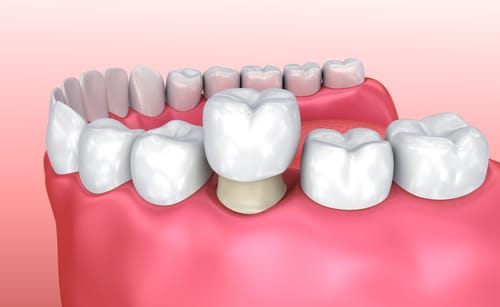Crowns
 Are you looking for a smart way of improving your tooth’s strength and function? The dental crown is a viable option to consider. It will also help you improve the look of your tooth to enhance the smile.
Are you looking for a smart way of improving your tooth’s strength and function? The dental crown is a viable option to consider. It will also help you improve the look of your tooth to enhance the smile.
What Are Dental Crowns?
These are fixed prosthetic restorations which are designed to help in the rehabilitation of damaged teeth. They’re primarily applied to restore the teeth to their original size and shape. During crown restorations, they are cemented on the teeth with massive cracks or teeth which have decayed. For comfort and good service, the crowns are custom-designed to fit over the tooth naturally.
On application, they work by fully covering the entire region of the affected tooth just over the gum line. The crowns used are made of a wide variety of materials like gold, ceramics, resin and porcelain, and metals, etc. They can be used to perform multiple activities apart from cementing the decayed or damaged teeth like protecting weak teeth, as well as providing support to teeth fitted with large fillings. Most people also use it as a means of preventing further damage to cracked teeth.
For installation purposes, your dentist will first apply anesthetic to your tooth, so you don’t feel any pain during the process. He/she will then use dental drills with an abrasive bur to peel off the tooth’s outer surface both on its sides and the top. This will help provide enough space for installing the crown. Now, if your tooth was damaged to such an extent that it doesn’t have enough surface that will support the crown, the dentist will add a crown buildup first. This will help build a foundation for supporting the crown.
He will then use a digital scanner, putty, or a dental impression paste to create your tooth’s impression. The dentist then forwards this to the dental crown laboratories to make a crown for you. Note that the crown will not be delivered immediately after the dentist has submitted the tooth’s impression to the laboratory. Instead, it may take up to 1-2 weeks for a lab fabricated crown.
After removing the top layer of your tooth, the dentist will not leave it uncovered for this waiting period. Instead, he/she will give you a temporary crown to protect the tooth. On your next appointment during installation, the dentist will apply special cement for installing the crown to the affected tooth. The crown will only be firmly get affixed on the tooth once the cement has cured.
What Are The Benefits Of Dental Crowns?
Now, dental crowns are a viable option if you’re looking for a long-term option of protecting your teeth. They can last for around 5 to 15 years. They also have a higher success rate as compared to other standard dental restoration procedures.
Here are some of the benefits of dental crowns;
1. Enhancing your tooth’s appearance. These crowns are creatively designed to improve how a damaged tooth appears. From the shapes to colors and cracks, etc., it works by covering them to help you regain your beautiful smile.
2. They help provide support for the teeth that are severely damaged due to tooth decay. Apart from the pain, and foul smell that comes from the decayed tooth, they also get weaker and can easily fall off. Here’s where the crowns also come into play. They will offer extra support to protect the teeth and increase their healing and restoration.
3. They also hold badly broken or cracked teeth in place. If you’re looking for a way of holding the cracked tooth in place, the dental crowns are a highly recommendable option you should consider. It will keep the pieces in place and speed up the healing process.
4. They also help protect the teeth which have gone through the root canal procedures.
5. Covering dental implants. The uses of dental crowns are not limited to just protecting damaged teeth and holding damaged teeth in place. You may also use them to cover dental implants such that they appear and also work just like a healthy tooth.
Can Dental Crowns Cause Health Problems?
It’s worth noting that the primary materials used in making the dental crowns consist of mixtures of metals. Metals have been associated with allergic reactions so you may feel a little discomfort, but it isn’t a must. This condition is very rare.
How Should I Prepare For Dental Crown Procedure?
As we mentioned before, installing a dental crown isn’t a one-day process. Instead, it involves some steps which might make it a bit longer.
Here’s how to prepare for this procedure;
Step 1; Making the appointment. Here you will visit your dentist who will perform his evaluation. He will then shape the tooth for a crown, take crown impressions, and give you a temporary crown as you wait for the ‘main’ crown to be delivered from the laboratory. The temporary crown is usually affixed with weaker cement to make it easy to remove when installing the ‘final’ crown.
Step 2; Keep the appointment. On the day of installing the final crown, it’s prudent that you keep the date. Stay relaxed and be sure to follow your medications as directed by the dentist.
Step 3; Ask as many questions as possible. This is a critical procedure that takes quite a long time. Don’t shy off and be keen to ask as many questions as you can about the process.
Your dentist will give you all the guidelines that will help you recover fast and get the best form of this procedure.
What’s The Recovery Process Of Dental Crowns?
Note that your body needs sufficient time to fully recover from the inflammations and irritations that come with this procedure. You will undoubtedly feel some pain, discomfort, and sensitivity during the initial days, but its natural and will soon fade away.
If your dentist used an anesthetic to help you numb the pain, the numbing effect might still be active for some hours after the process. Because of this, you may not feel warning sensations of pain or heat, making you prone to biting or burning yourself.
To avoid this, it’s advisable that you keep off eating hard foods or drinking hot liquids. To manage the subtle bouts of pain that comes after this procedure, you may need to use medications e.g., use ibuprofen.
You may also use topical anesthetic gels or toothpaste for sensitive teeth to manage the irritation due to the dental implants and sensitivity. It will take a couple of days or weeks to recover fully. If the pains persist or get worse, it’s recommendable that you call your dentist.
Take Away
Dental Crown procedures are sensitive procedures. It’s always critical that you only have a licensed and experienced dentist carry out the process for you.
